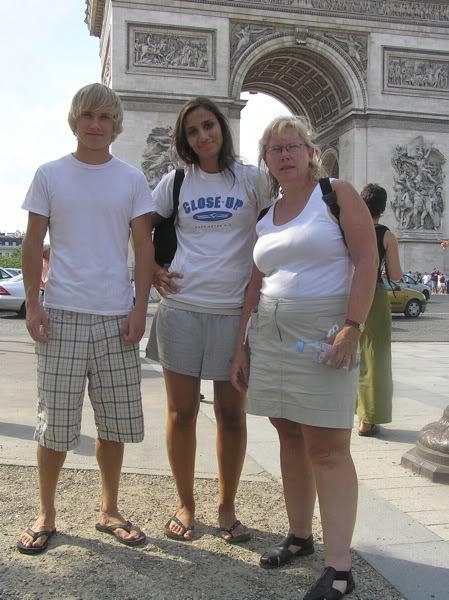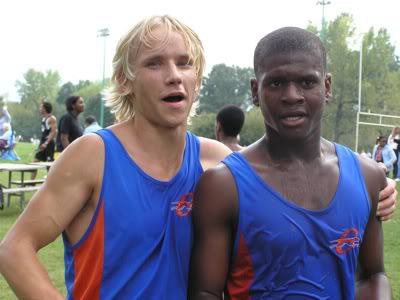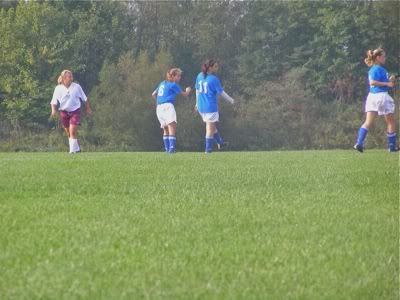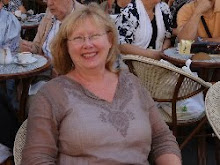Nicholas and Tonya, my salt-and-pepper set, on the Champs-Élysées in Paris
(forgive my scowl - you have no idea how hot it was that day)
On Sunday and all day Monday I felt that I should be posting something to commemorate Martin Luther King Day. I tried for something profound. I tried to be deep. I tried to be uplifting. I tried to create the second “I Have a Dream” speech. I tried to imagine a time when I had been discriminated against. But it all sounded so inauthentic and pompous. Who am I to make grand statements about discrimination and struggle after a week vacationing in New York City and then returning to my nice home in a lovely, tree-lined neighborhood where everyone walks their dogs to the local coffee shop?
And then I read a touching piece of writing by Bella on her blog One Sister’s Rant in response to a writing challenge on Beverly Diehl’s blog to talk racism. She learned at a young age what it meant to accept herself when she and her sister doused themselves in powder to lighten their skin. They got in trouble, but only to the extent that their mother was upset because they did not want to accept who they were. Their childlike reasoning concluded if they looked different they would be seen as better people.
Her story reminded me of my own children when we brought them home from Russia in 1995. I called them “my little salt and pepper set” because my son is as fair as the Scandinavians across the Bay of Finland near his home city of St. Petersburg and my daughter is as dark as those in the ethnic regions of the former Soviet Union around the Black Sea. At 8 and 7 ½ years old, they had spent their entire lives in the narrow confines of the orphanage system in a very closed country. I had such fear that they would not be easily accepted because of their language issues or because they knew nothing about American culture except Flintstones cartoons. I worried that we would face a minefield of prejudices.
And then I read a touching piece of writing by Bella on her blog One Sister’s Rant in response to a writing challenge on Beverly Diehl’s blog to talk racism. She learned at a young age what it meant to accept herself when she and her sister doused themselves in powder to lighten their skin. They got in trouble, but only to the extent that their mother was upset because they did not want to accept who they were. Their childlike reasoning concluded if they looked different they would be seen as better people.
Her story reminded me of my own children when we brought them home from Russia in 1995. I called them “my little salt and pepper set” because my son is as fair as the Scandinavians across the Bay of Finland near his home city of St. Petersburg and my daughter is as dark as those in the ethnic regions of the former Soviet Union around the Black Sea. At 8 and 7 ½ years old, they had spent their entire lives in the narrow confines of the orphanage system in a very closed country. I had such fear that they would not be easily accepted because of their language issues or because they knew nothing about American culture except Flintstones cartoons. I worried that we would face a minefield of prejudices.
When my children arrived in their new home, they reacted badly toward the diverse ethnic groups in our corner of the city. They had never seen a black person before, although they had internalized the Russian disdain for non-white ethnicities. (You can read more about that country’s racism here and here.) That first summer when my son saw them – on our street, at the grocery store, in the park – he would, with no subtlety, point at them and make comments in Russian about their presence or appearance. Needless to say, I was mortified and made every effort to quiet him because I could tell by his tone if not his words that he was saying nothing good about them. I said a small prayer of thanks that no one could understand what he said.
That fall he began school in a classroom full of students who were Jewish, Irish Catholic, Indian, African-American, Asian, mixed race, and everything in between. Half of the students were children of university professors and the other half were on the free lunch program. Once he was settled in amidst this American melting pot, I never heard those comments again. Many of his friends have been and are the same African-Americans that repelled him at first. They saw him for the joyful presence he was and he saw beyond color to their humanity.
Nicholas and his cross-country teammate, Larry, after a hard race
(women pay hundreds of dollars for that hair color)
My daughter, on the other hand, directed her negative feelings only toward herself. She has the most perfect dark brown, almost black hair. Perfectly straight and thick. Her eyes are deep coffee and her skin a light olive tone. Yet when she was young all she wanted was blonde, wavy hair and fair skin like my sisters. She wanted to look like all the girls with Irish Catholic and German backgrounds that filled her classroom, that fill our town. As the mother, I was glad that her dark looks made it easy for us to distinguish her among all the blonde ponytails flying across the soccer field or basketball court. It’s also what made my husband and me sit up like a rocket and zero in on her when we first saw the video of orphanage kids that our adoption agency had sent us.
Yet she wanted nothing more than not to stand out. She knew her looks attracted attention – that she looked different – because people would stop me on the street and hand me their card just in case I ever wanted to start her on a modeling career. But at the beauty salon she kept trying to get our stylist to put blonde streaks in her hair. The stylist kept refusing, telling her she was not made to be blonde and she’d regret it later if she touched her perfect hair. Blonde didn’t match her lovely olive skin, she added.
Eventually, her desire to look like something other than herself faded as her interest in sports grew. Soon she was just another female high school athlete in soccer shorts and ponytail, with a headband made out of day-glo orange athletic tape. Two years ago, though, she had a chance to experience what life would have been like if she and her olive skin had never been a part of our family. She returned to her home city of St. Petersburg, Russia for a college semester abroad.
All around her she could see the treatment of non-whites in that country. She told us how much they hated the African immigrants or the Kazakhs or Chechnyans. Russia for Russians. She told us about the skinheads roaming the streets. And she told us that the Russians didn’t know what to do about her at first. She had the olive skin of those they hated, plus she spoke almost perfect Russian, which she used to help all her fellow students navigate the intricacies of life in that difficult country. Yet she had the visible confidence of an American, not a put-upon remnant of Soviet domination. Was she an ethnic Russian or was she American?
Mostly, she’s a survivor. She is fully herself. She wants to travel the world and has made friends from more countries than I have.
Yet she wanted nothing more than not to stand out. She knew her looks attracted attention – that she looked different – because people would stop me on the street and hand me their card just in case I ever wanted to start her on a modeling career. But at the beauty salon she kept trying to get our stylist to put blonde streaks in her hair. The stylist kept refusing, telling her she was not made to be blonde and she’d regret it later if she touched her perfect hair. Blonde didn’t match her lovely olive skin, she added.
Eventually, her desire to look like something other than herself faded as her interest in sports grew. Soon she was just another female high school athlete in soccer shorts and ponytail, with a headband made out of day-glo orange athletic tape. Two years ago, though, she had a chance to experience what life would have been like if she and her olive skin had never been a part of our family. She returned to her home city of St. Petersburg, Russia for a college semester abroad.
All around her she could see the treatment of non-whites in that country. She told us how much they hated the African immigrants or the Kazakhs or Chechnyans. Russia for Russians. She told us about the skinheads roaming the streets. And she told us that the Russians didn’t know what to do about her at first. She had the olive skin of those they hated, plus she spoke almost perfect Russian, which she used to help all her fellow students navigate the intricacies of life in that difficult country. Yet she had the visible confidence of an American, not a put-upon remnant of Soviet domination. Was she an ethnic Russian or was she American?
Mostly, she’s a survivor. She is fully herself. She wants to travel the world and has made friends from more countries than I have.
Tonya (#11), one dark ponytail amid a sea of blonde
Like any mother with children just slightly outside the norm, I fretted every day that they would face discrimination for being “different” or “other” because I ripped them from an insecure world and plopped them down into this comfortable, economically privileged, and, yes, rather closed culture of my own hometown (most important question – “Where’d you go to high school?” Tell me that and I can tell your life story). I’m blessed that they never needed a Martin Luther King to fight for their acceptance.
When we look at their experiences we see that hatred toward ourselves and hatred toward others can start at such a tender age. Embracing differences not only in others but also in ourselves can just as easily be taught. Although I’m sad my children had to feel what it was like to be an outsider in two countries, I’m proud that they never let that poison their spirits. And I repeat, as a mother I’m grateful every day that they escaped so much of the potential hurt and prejudice that attacks so many innocent children. Mine were lucky enough, as Dr. King had hoped, to be judged by the content of their character. Let’s hope we will all always be given that chance.
When we look at their experiences we see that hatred toward ourselves and hatred toward others can start at such a tender age. Embracing differences not only in others but also in ourselves can just as easily be taught. Although I’m sad my children had to feel what it was like to be an outsider in two countries, I’m proud that they never let that poison their spirits. And I repeat, as a mother I’m grateful every day that they escaped so much of the potential hurt and prejudice that attacks so many innocent children. Mine were lucky enough, as Dr. King had hoped, to be judged by the content of their character. Let’s hope we will all always be given that chance.
Have you ever worried that your children would face discrimination? Were you ever discriminated against as a child? Share your experience in the comments box. Then visit Beverly's blog to see links to the stories that others shared.
The garden at Château Chenoceau in the Loire Valley of France show us that
more colors make the garden a better place








![Grace [Eventually]: Thoughts on Faith](http://photo.goodreads.com/books/1166504427s/12542.jpg)









18 comments:
Julie, what a story! You adopted kids from Russia. I bow to you for that. If you read my stories on She Writes you know I'm from Russia too. That's why my appreciation of you is so deep.
As to discrimination - yes, unfortunately. I'm Jewish, and when I lived in Russia, I had been Jewish, an outsider, to a degree. Than my family immigrated to Israel, and suddenly I became Russian, an outsider again, with no language and a different culture. When I moved to Canada, I remained a Russian immigrant (ironic, isn't it?) because I don't practice Judaism and don't speak Hebrew.
Now, I'm a writer in English, but some writers wouldn't accept me because I speak with an accent and don't have formal education in English or writing. I have a book accepted for publication, but my publisher and editor don't know that I write in a foregn language. I hope they won't find out until at least a couple of my novels are published.
Do I discriminate myself? I'm not complaining. It's just that the situation for almost any immigrant is complicated, and many hold their immigration status (and their different culture that comes with it) against them. Your kids are so lucky!
I too am awed that you had the persistance and courage not only to adopt from Russia, but to take on older kids. They are gorgeous. My kids, knock wood haven't been dicriminated against but when I decided to have my son on my own almost 26 (how can that be?) years ago it was not as accepted as it is now and I worried he'd be made fun of for not having a father. He never was and when Mr. Right never showed I went on to have my daughters. So far, so good.
Olga and Bridget, thanks for your kind comments about adopting our kids. It hasn't been a piece of baklava raising them, but I know so many parents who have had so much more of a challenge. I consider myself lucky to have two children who arrived with such strong spirits. I can't claim any part in that.
I'm a whitey-white (a towhead as a youngun'), married a black man, had a daughter.
A pair of picnic salt & pepper shakers sat on the dining room table, as well as a leftover light brown wine cork. During dinner, my daughter took the salt and placed it to one side, the pepper to the other, then picked up and put the wine cork in between them and said, "You're the salt, Daddy's the pepper and I'm the cork!"
She recognized that white plus black created brown; I couldn't believe it—at two years of age!
I had thought we should have one more child because I like having my siblings in my life, but also because as a mixed-race child, I wanted my daughter to have a brother or sister with whom she could talk when she was on the receiving end racism. But my marriage ended when she was only 8 months old. I did have a difficult time sometimes when people at the grocery store would often admire this adorable girl, but ask, "Is she yours?" Well, of course she's mine! I wanted to scream—whether I birthed her or not!
I was worried about the reaction from black women in particular because from my experience, blonde white women with black men did not sit well with them; but it was wonderful to find they were the most accepting, admiring and cooing segment of the population.
One older black woman even took the time to tell me about her parents who grew up in the south—mom, white; dad, black and who were run out of town at the end of a shotgun. She said she was so happy our world had changed so significantly since then.
My ex-husband had gone through a point of thinking that he should break up with me and date only black women. I told him to go ahead if he felt he had to, but that in my experience love didn't come around every day, and when I fell in love, I was going to love that person to the best of my ability no matter color of skin, ethnicity, etc. Life and love is too precious to waste.
Your family is beautiful—what an incredible gift you've given your children, and them to you as well by coming into your life. L'Chaim!
I have to echo Kat's words - what an incredible gift you have given your children. Your family is beautiful, and so are you!
IMO, it's truly love - not blood - that makes a family. Your children are beautiful, and what a wonderful life you have given them, with so many rich experiences so far.
Thanks so much for joining in the blogfest. :-)
You may have thought you were not being profound, but you've hit it out of the ball park here. It couldn't have been more relevant on this commeration of MLK.
Great kids! What an awesome family. As always, you write an awesome post...and what a conversation you have begun!
I am a Jew by Choice (a convert), and I found I had to embrace my spiritual path without the help and support of some long-time friends who were appalled at my decision. Even some family members aren't happy about it, more than 15 years later.
It's very odd to be liked one day and disliked the next while still being the same person! I cannot pretend to know what it's like to be a racial minority in this country, but this brush with prejudice was a real shock. It made me realize how much I didn't see on a daily basis in my WASP days.
I think this post definitely counts as deep and meaningful! It sounds like you've done a fabulous job raising your kids to love who they are! And I totally sympathize with your expression in the first photo - I always have to fight not to make that face after a long day of sightseeing!
Julie, I love your perspective. Your children are very lucky to have you as their mother. They sound like wonderful kids.
Julie, another great post. The family would not be the same without Nick and Tonya and we are so grateful that you and Brad took the plunge adopting two at the same time. This choice was harder on you guys, but we got more than double the fun from your efforts!
Thanks to everyone who praised me for taking the chance on my kids. Despite all the challenges, we got great material to work with. They came as fully formed human beings, personalities firmly set. They are remarkably resilient.
Nadine, I was so taken by your statement about being liked one day and disliked the next. I can't comprehend how people can change so quickly. You're still basically Nadine (unless you were a serial killer and your conversion altered your personality).
Kat, kids always get to the heart of the matter , don't they.
Hi, Julie! ~
Stopping by way of Beverly Diehl's MLK Blogfest ;-)
I'm impressed and grateful that you rejected the opportunity to get on a soapbox and try to re-create an "I Have a Dream Speech". There's more than enough of that going around -- haha!
I love your story -- appreciate your straight-forward authenticity!
My mixed-breed kids' dad is Chinese so I can relate to some of your feelings of confusion and protectiveness early on. Maybe when we keep mixing up the races and watering down the 'pure' bloodlines then racism will become obsolete because the different 'colors' of people will become indistinguishable from each other!
Blessings to you!
Ha ha, Linda. I like your idea of watering down the "pure" bloodlines. Maybe you're right.
Julie, I know many families who adopted older kids from Russia. WHat time these children had before being adopted. So intense. They are beautiful!
They look like great kids. As a mom, I could see the advantage of having a dark-haired child among the sea of blondes. It's interesting how children can often sort these issues out without our intervention. Thanks for sharing these stories.
Wonderful post, Julie - I love getting to know you and your family here. Strikes a chord... One of my close friends is Ukranian, spent much of his 20's working in an orphanage. Now an American citizen, he and his partner have begun the process to adopt through our state's foster system. I'm so thankful to families like yours and his.
Hi, Julie. I'm a Filipino who married a white American and raised his two white daughters along with our mixed-race daughter. Our youngest did go through what Tonya did, in terms of wishing for blonde hair and blue eyes. She was in the fourth grade when she verbalized this, saying that the boys in her class only liked the blonds.
While Tonya had sports, she had cheerleading to bring her out of her shell and appreciate herself just as she is. Despite the cost, I kept her in cheer squad her last two years in high school.
At 24, she's often the recipient of compliments on her looks from people intrigued by the mix.
As for me, at 24 and an immigrant, I was often presumed not to know how to speak English or drive (Asian stereotypes!) I learned to insist that my white husband accompany me if I needed to assure I'd get good customer service. Only now, in midlife, am I getting the respect everyone deserves simply for being a human being. I don't look any less Asian, but I certainly have the American confidence now to gain and demand, when necessary, respect!
Yes, Scrollwork. That American sense of confidence is definitely a cultural characteristic.
Post a Comment